Bitcoin (BTC) has shrugged off the weakness in the United States equities markets and is attempting to start a recovery on Nov. 30. Buyers are attempting to achieve a monthly close above $17,000. This suggests that the selling that had picked up due to the FTX crisis may be reducing.
Usually, smaller investors panic and dump their holdings in a bear market but it has been the opposite with Bitcoin investors. According to Glassnode data released on Nov. 27, investors holding less than one Bitcoin, also called shrimps, bought 96,200 Bitcoin since the FTX crash.
Along similar lines, investors holding between 1 to 10 Bitcoin, classified as crabs, bought 191,600 Bitcoin over the past 30 days. This shows investors are continuing to accumulate at lower levels.
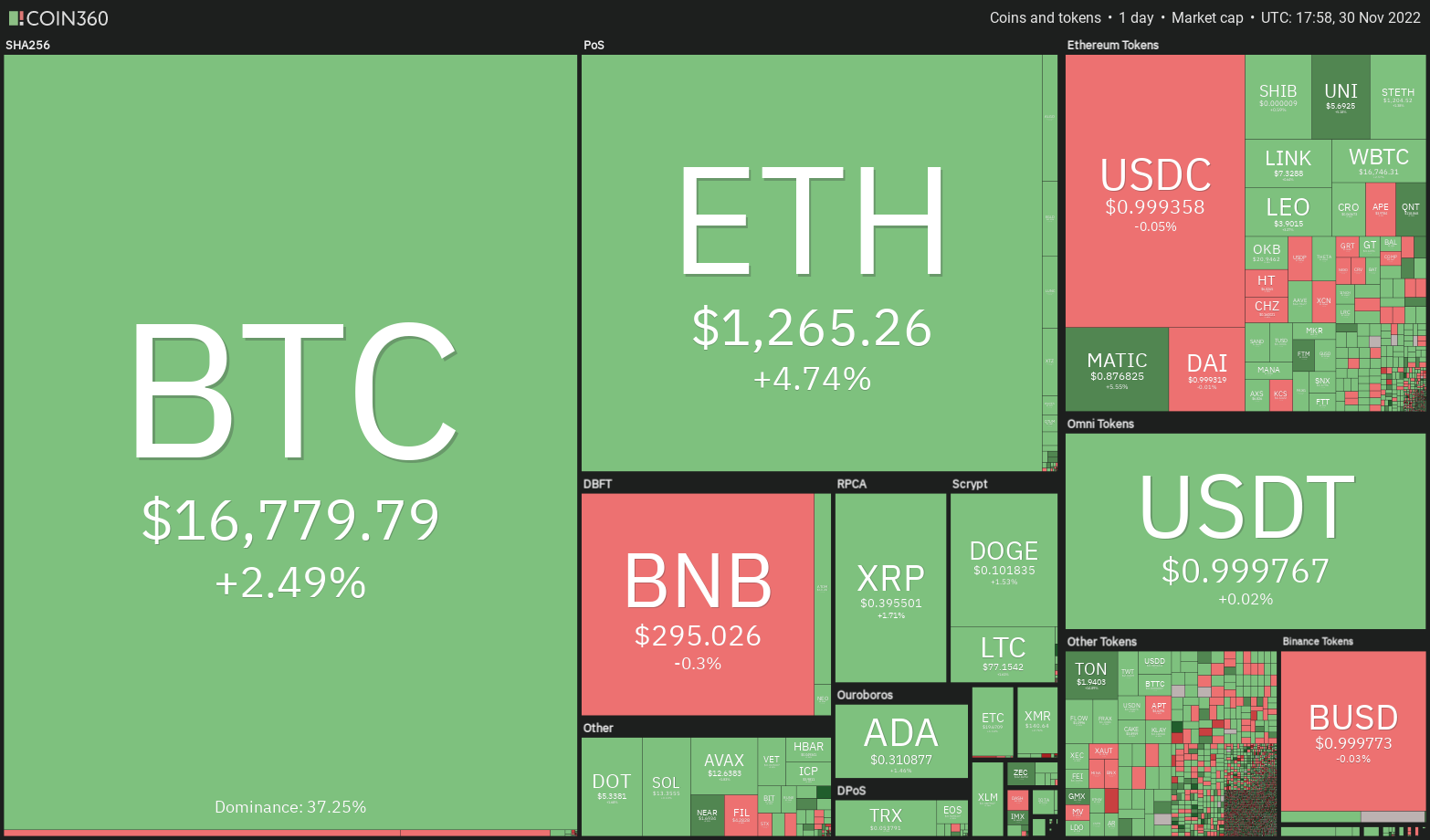
However, a sharp recovery in Bitcoin’s price is unlikely for some time. Trading firm QCP Capital believes that the United States Consumer Price Index data on Dec. 13 and the U.S. Fed’s policy decision on Dec. 14 could act as risk factors because many investors could be “forced to continually sell assets to raise liquidity.” QCP expects the situation to turn around only in the second or third quarter of next year after the Fed possibly pivots and releases liquidity in the system.
Could Bitcoin lead the cryptocurrency markets higher? Let’s study the charts of the top-10 cryptocurrencies to find out.
BTC/USDT
Bitcoin turned up from $15,995 on Nov. 28 and broke above the developing descending triangle pattern on Nov. 30. This invalidated the bearish setup and may have attracted buying from the bulls who are trying to push the price above the 20-day exponential moving average ($16,910).
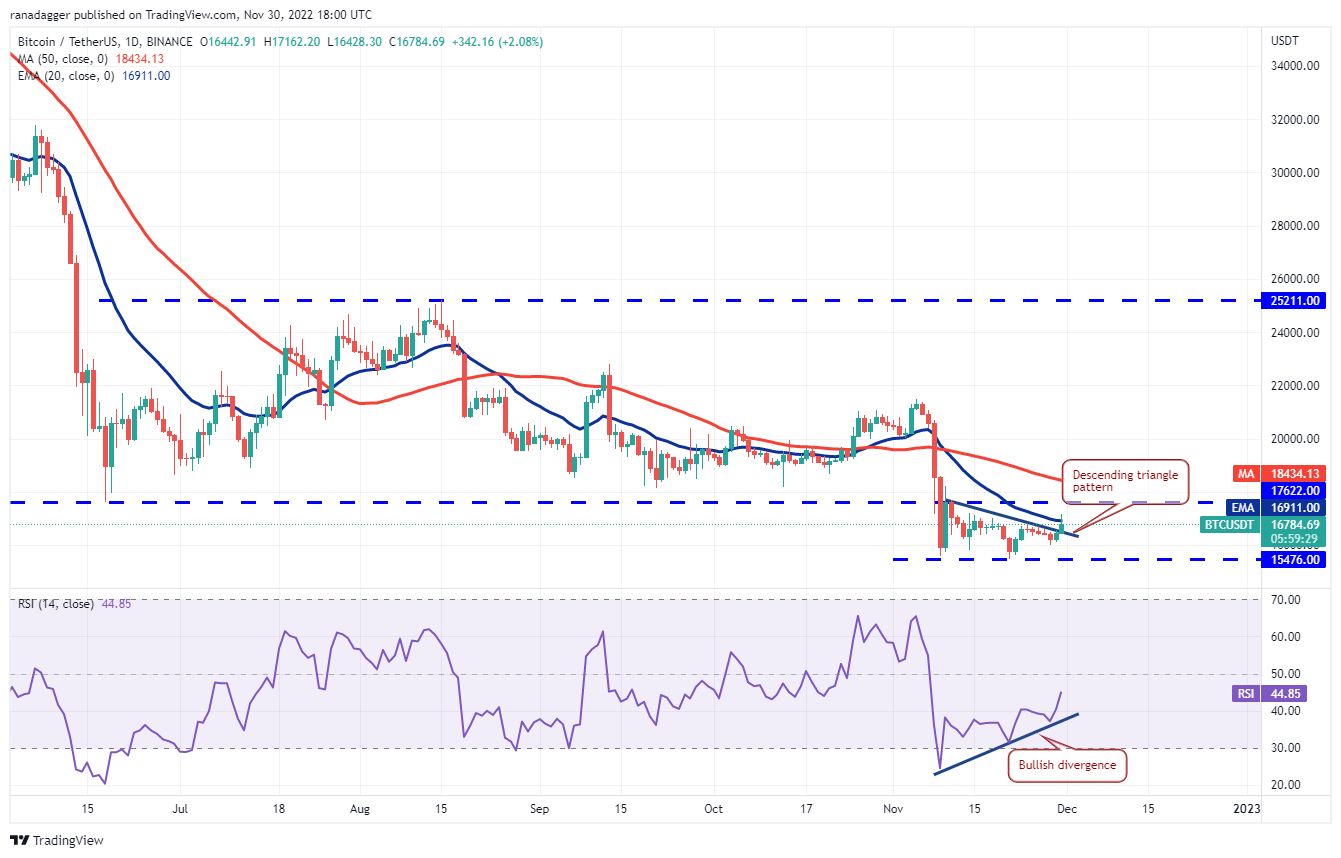
A close above the 20-day EMA will be the first sign that the bears may be losing their grip. The BTC/USDT pair could then rally to $17,622 and later to the 50-day simple moving average ($18,434). The sellers are expected to defend this zone with vigor.
If the price turns down from the overhead zone but bounces off the 20-day EMA, it will suggest that bulls are buying the dips. That could increase the possibility of a rally to $20,000 and then to $21,500.
Another possibility is that the price turns down from $17,622. If that happens, it will suggest that the pair may consolidate between $15,476 and $17,622 for some more time.
ETH/USDT
Ether (ETH) turned down from the 20-day EMA ($1,234) on Nov. 26 but the bulls arrested the decline at $1,151 on Nov. 28. This indicates a pick-up in demand and a sign that the sentiment could be turning positive.
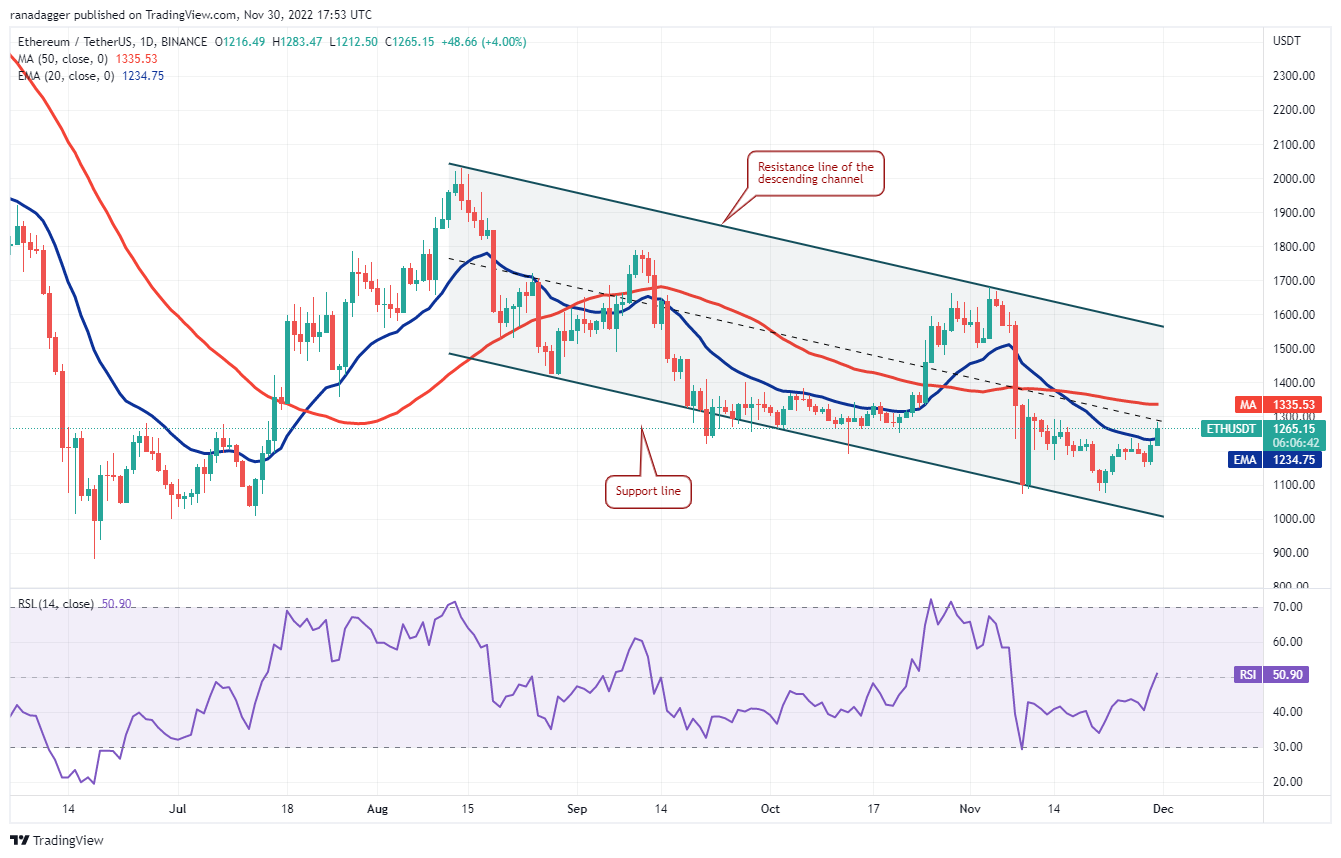
Buyers have pushed the price above the 20-day EMA and will next attempt to break above the 50-day SMA ($1,335). If they succeed, the ETH/USDT pair could rally to the resistance line of the descending channel. This level may attract strong selling by the bears because a break above the channel could indicate a possible trend change.
To invalidate this bullish view, the bears will have to defend the 50-day SMA and pull the price back below $1,051. The pair could then decline to the support line of the channel.
BNB/USDT
BNB (BNB) bounced off the moving averages on Nov. 29 but the bulls are struggling to build upon this move. This suggests that bears are likely to pose a strong challenge between $300 and $318.
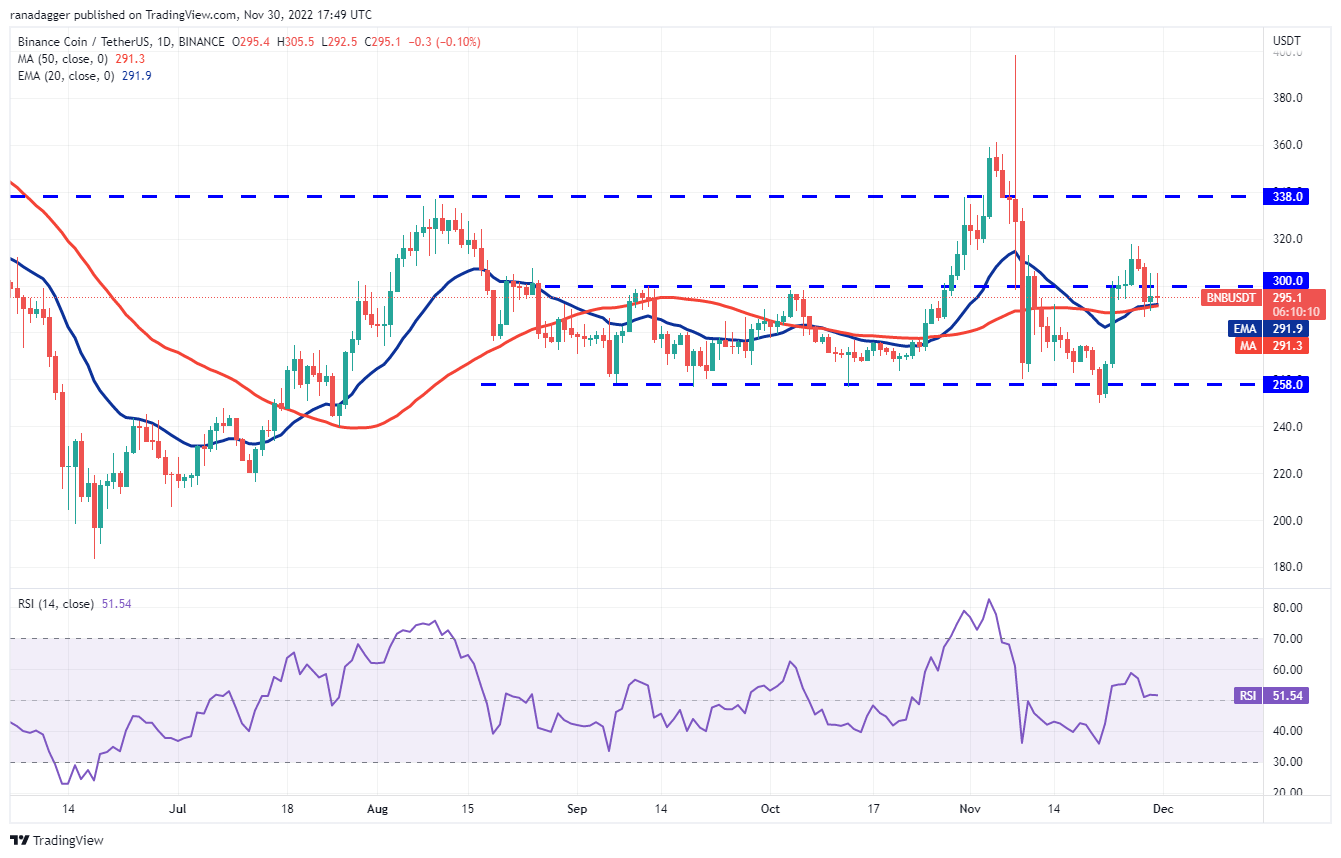
The 20-day EMA ($292) is flattening out and the RSI is just above the midpoint, indicating a balance between supply and demand. The advantage could tilt in favor of the buyers if they catapult the price above $318. That could clear the path for a rally to $338 where the bears may again erect a stiff barrier.
This positive view could invalidate in the near term if the price turns down and plummets below the moving averages. The pair could then decline to the support at $258.
XRP/USDT
The bulls successfully defended the retest of the breakout from the symmetrical triangle on Nov. 28. This is a positive sign as it shows that traders are buying the dips in XRP (XRP).
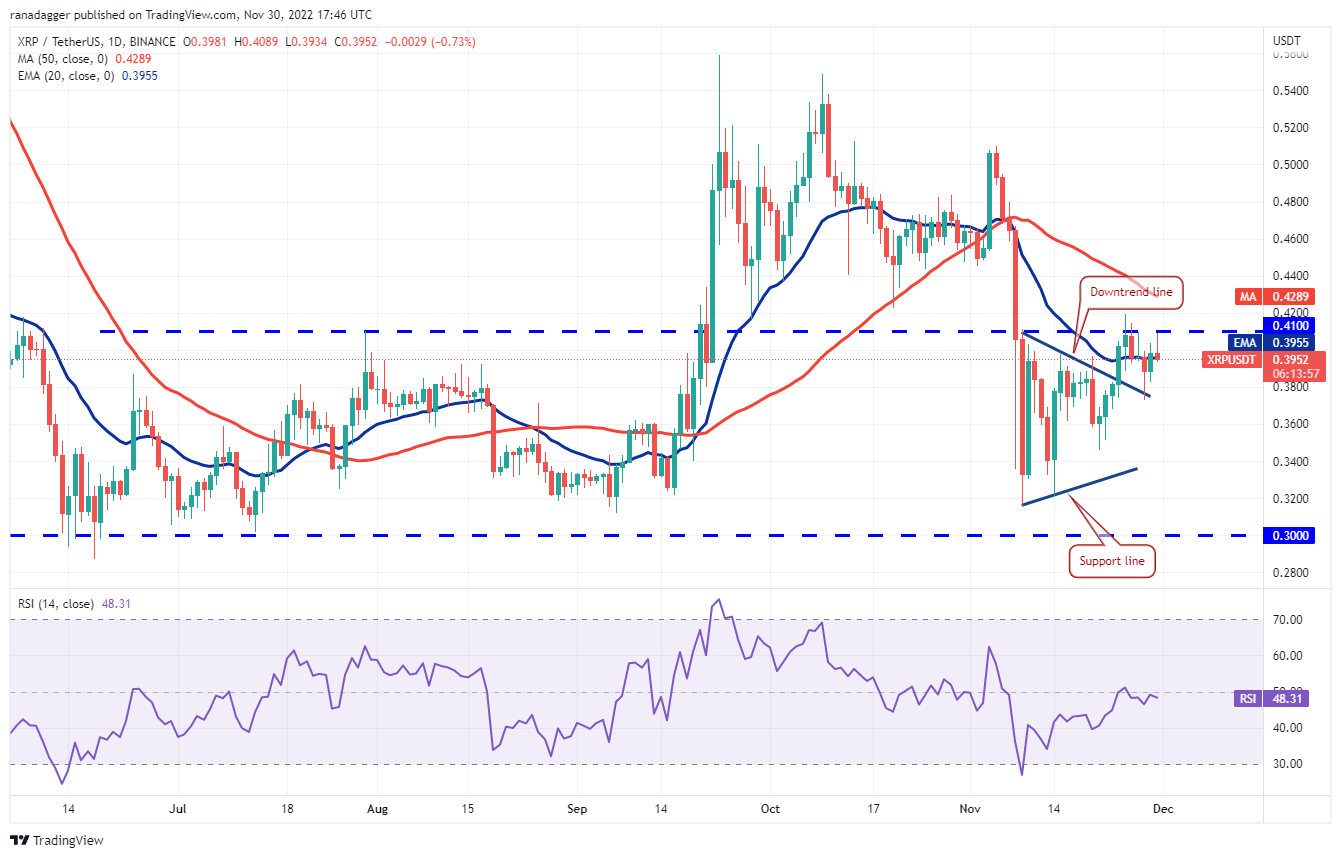
The bounce has reached the overhead resistance at $0.41, which is an important level to keep an eye on. If bulls catapult the price above this resistance, the XRP/USDT pair could attempt a rally to $0.45 and then to $0.51.
On the other hand, if the price turns down from the current level, it will suggest that the bears are aggressively selling near $0.41. They will then again try to pull the price inside the triangle. If they can pull it off, the pair could drop to $0.34.
ADA/USDT
Cardano (ADA) remains in a downtrend but the bullish divergence on the RSI suggests that the bearish momentum may be weakening.
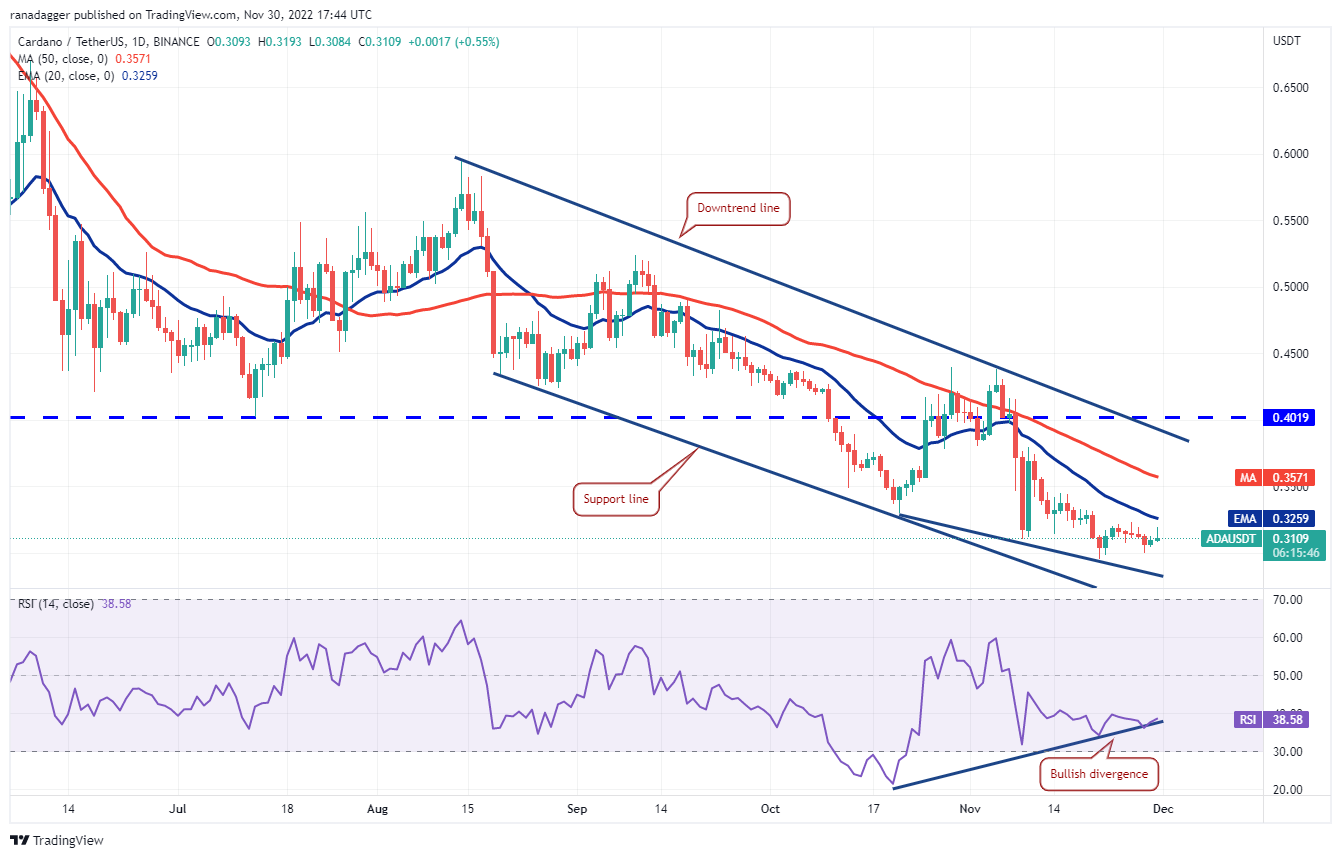
The bulls will have to thrust and sustain the price above the 20-day EMA ($0.32) to signal strength. If they do that, the ADA/USDT pair may start a recovery to the downtrend line. The 50-day SMA ($0.36) may act as a resistance but is likely to be crossed.
Conversely, if the price turns down from the 20-day EMA, it will indicate that bears are selling on minor rallies. The bears will then try to resume the downtrend and sink the price to the support line.
DOGE/USDT
Dogecoin (DOGE) bounced off the 20-day EMA ($0.09) on Nov. 28, indicating that the sentiment has turned positive and traders are buying the dips.
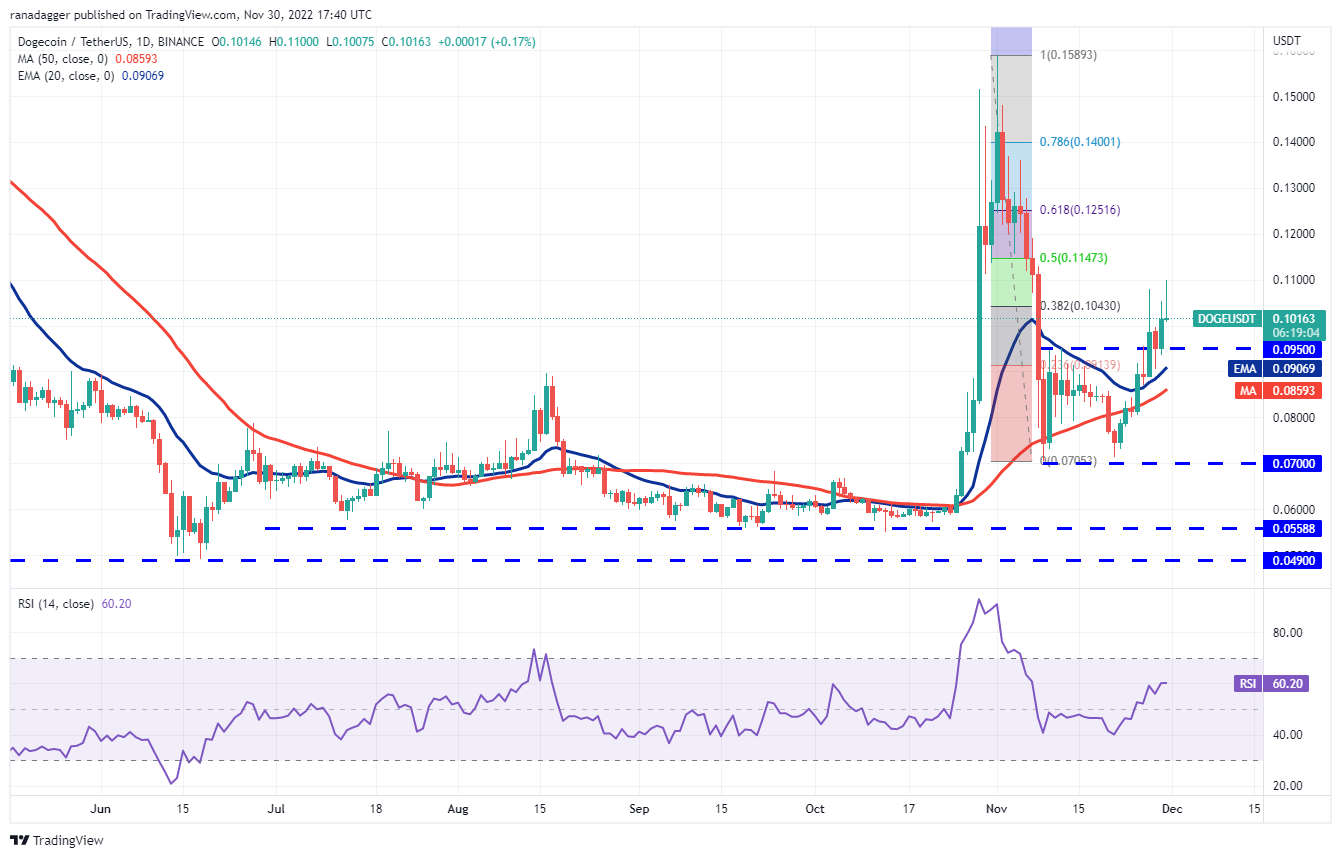
The upsloping 20-day EMA and the RSI above 60 suggest that bulls have the upper hand. Buyers are trying to extend the recovery to the 50% Fibonacci retracement level of $0.11 and next to the 61.8% retracement level of $0.12.
The sellers are likely to mount a strong defense in this zone. If the price turns down from it, the DOGE/USDT pair could again drop to the 20-day EMA.
On the contrary, if buyers thrust the price above the overhead zone, the pair could complete a 100% retracement and rally to $0.16.
MATIC/USDT
Polygon (MATIC) remains stuck between the 20-day EMA ($0.88) and the uptrend line. The 20-day EMA is flattening out and the RSI is near the midpoint, indicating a balance between supply and demand.
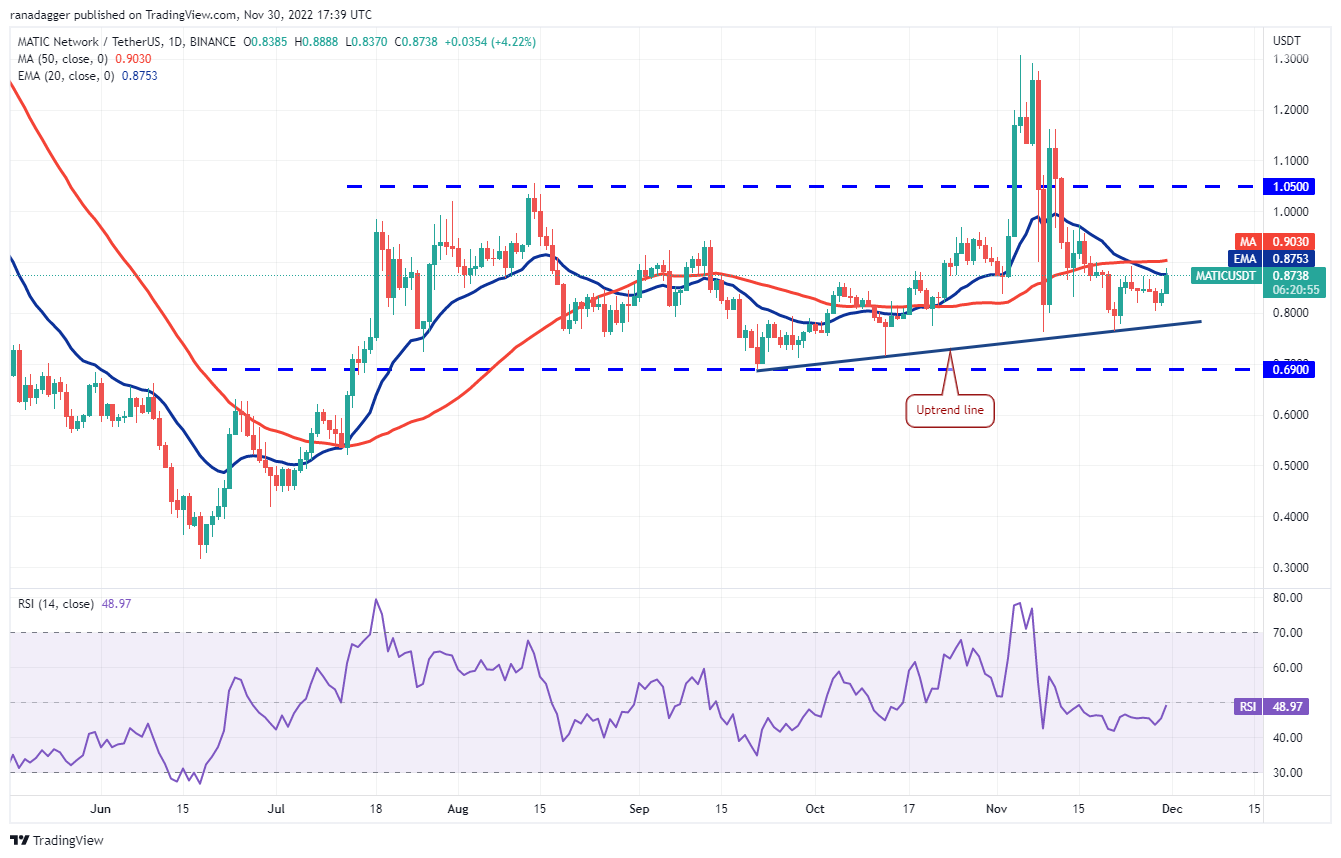
The bulls are trying to drive the price above the moving averages and gain the upper hand. If they succeed, the MATIC/USDT pair could climb to $0.97 and then rally to $1.05. This level could again attract selling by the bears but if bulls clear this hurdle, the bullish momentum could pick up.
This positive view could invalidate in the near term if the price turns down from the moving averages and slides below the uptrend line. The pair could then drop to the important support at $0.69.
Related: FTM price rebounds 50% as Fantom reveals 30 years runway (without having to sell its token)
DOT/USDT
Polkadot (DOT) turned up from $5.06 on Nov. 28, indicating that bulls are attempting to form a low at $5. The price reached the 20-day EMA ($5.52) on Nov. 30, which is likely to act as a formidable resistance.
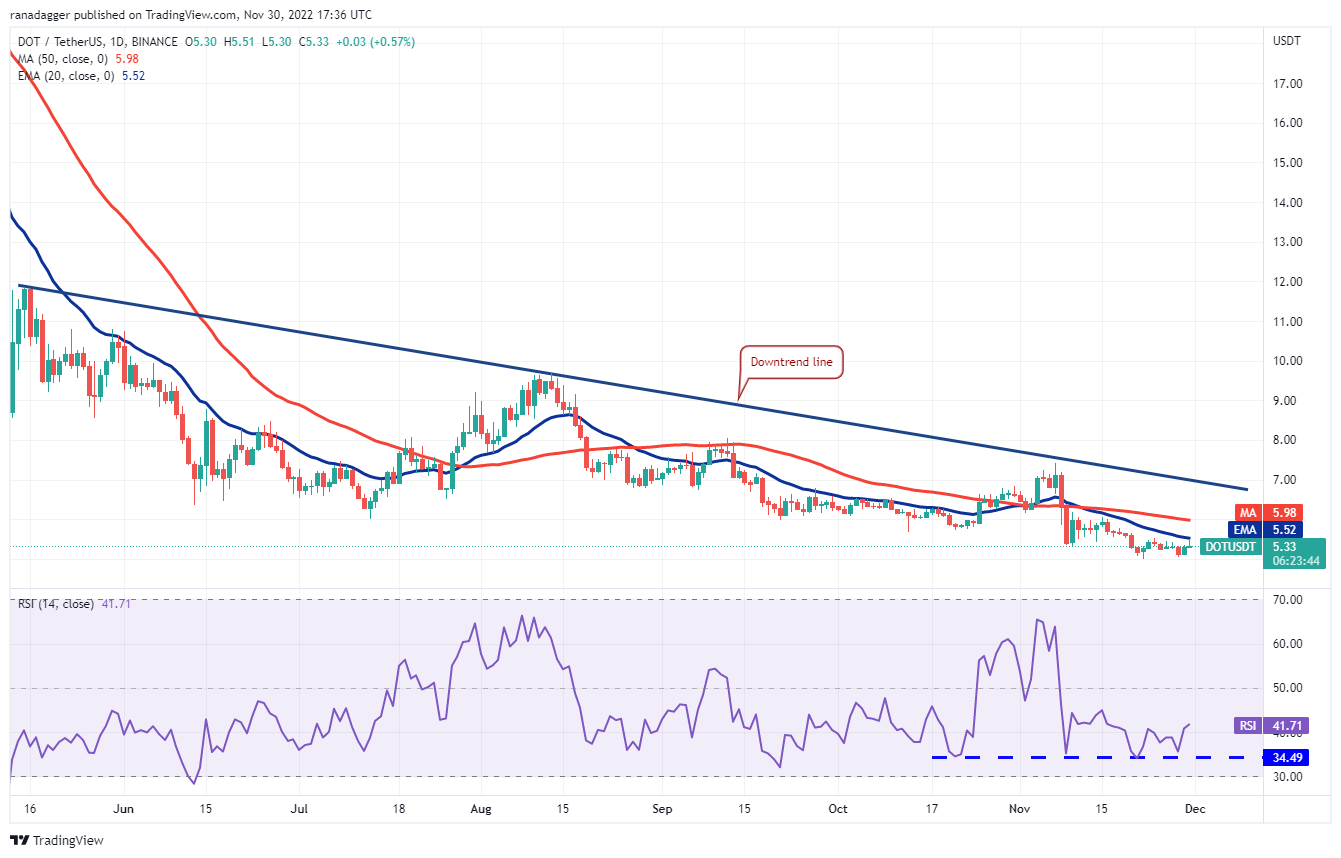
The RSI has formed a bullish divergence as it has not tracked the DOT/USDT pair lower. This indicates that the selling pressure could be weakening and increases the likelihood of a break above the 20-day EMA. If that happens, the pair could rise to the 50-day SMA ($6) and later attempt a rally to the downtrend line.
Alternatively, if the price turns down from the 20-day EMA, it will suggest that bears are viewing the relief rallies as a selling opportunity. A break below $5 could signal the resumption of the downtrend. The next support on the downside is $4.32.
LTC/USDT
The long tail on Litecoin’s (LTC) Nov. 28 candlestick shows strong buying at lower levels. This suggests that buyers are trying to flip the breakout level of $75 into support.
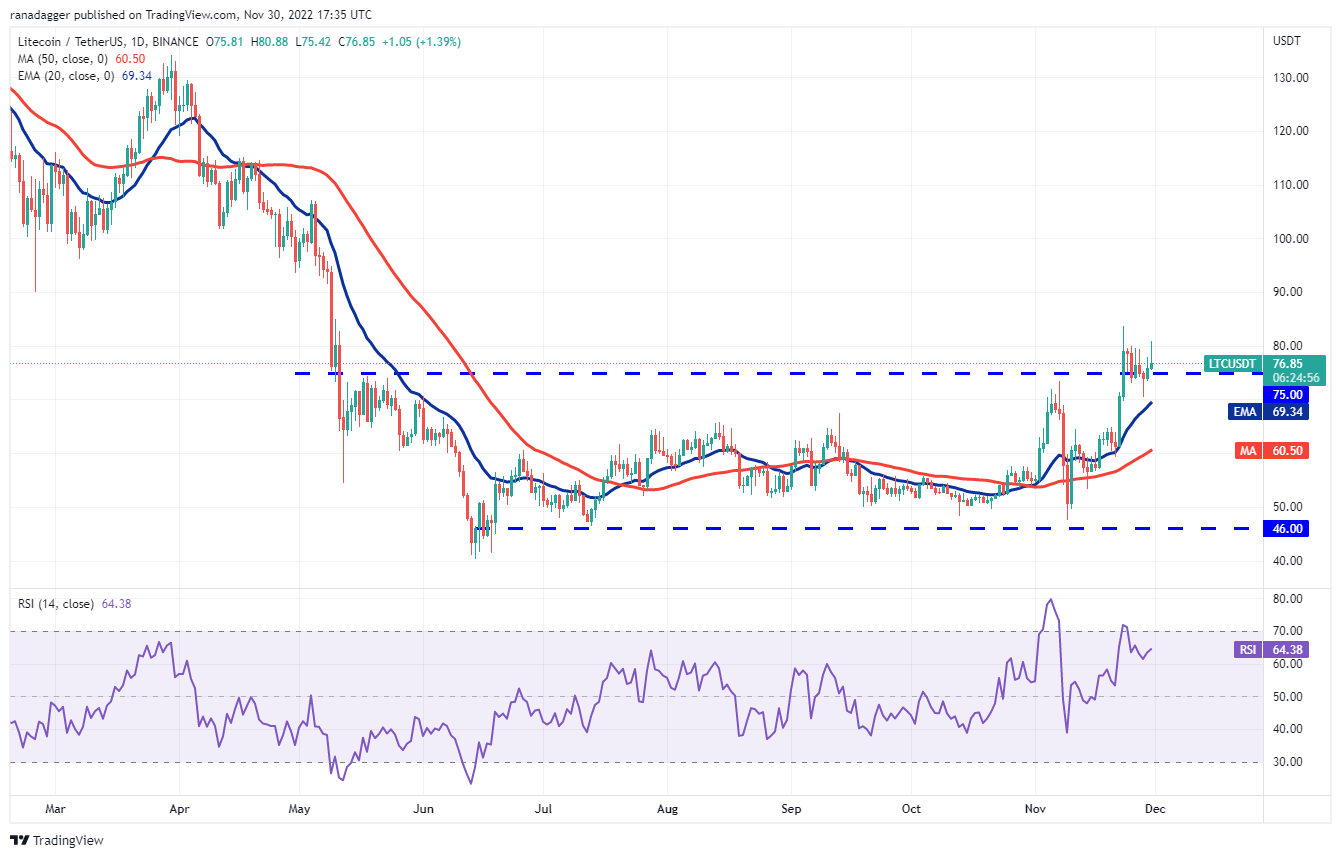
The rising 20-day EMA ($69) and the RSI in the positive territory indicate the path of least resistance is to the upside. Buyers will have to push the price above $84 to start a new up-move, which could reach $104.
Instead, if bulls fail to propel the price above $84, the bears will again try to sink the LTC/USDT pair below the 20-day EMA. If they manage to do that, several aggressive bulls may get trapped resulting in long liquidation. The pair may then fall to the 50-day SMA ($60).
UNI/USDT
The bulls are buying the dips to the support line of the symmetrical triangle pattern. This is a positive sign as it indicates demand at lower levels. Buyers are trying to strengthen their position by pushing Uniswap (UNI) above the 20-day EMA ($5.67).
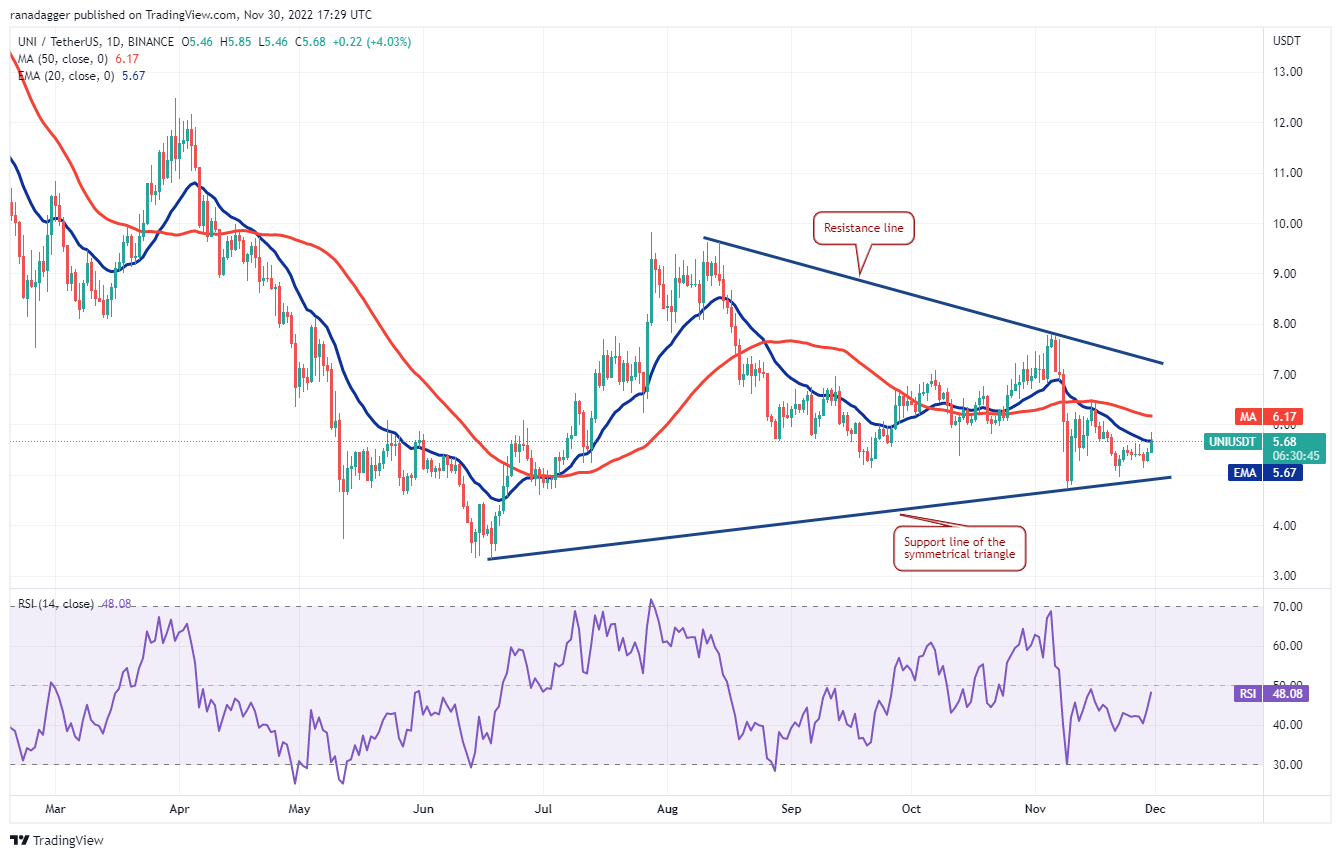
The RSI has risen close to the midpoint, indicating that the bearish momentum may be weakening. If buyers sustain the price above the 20-day EMA, the UNI/USDT pair may attempt a rally to the resistance line of the triangle. A break above the triangle will suggest a potential trend change.
Contrarily, if the price fails to rise above the moving averages, it will suggest that the bears continue to sell on rallies. They will then again try to pull the price below the triangle and open the doors for a decline to $4.60 and then $3.33.
The views, thoughts and opinions expressed here are the authors’ alone and do not necessarily reflect or represent the views and opinions of Cointelegraph.
This article does not contain investment advice or recommendations. Every investment and trading move involves risk, and readers should conduct their own research when making a decision.
 cointelegraph.com
cointelegraph.com